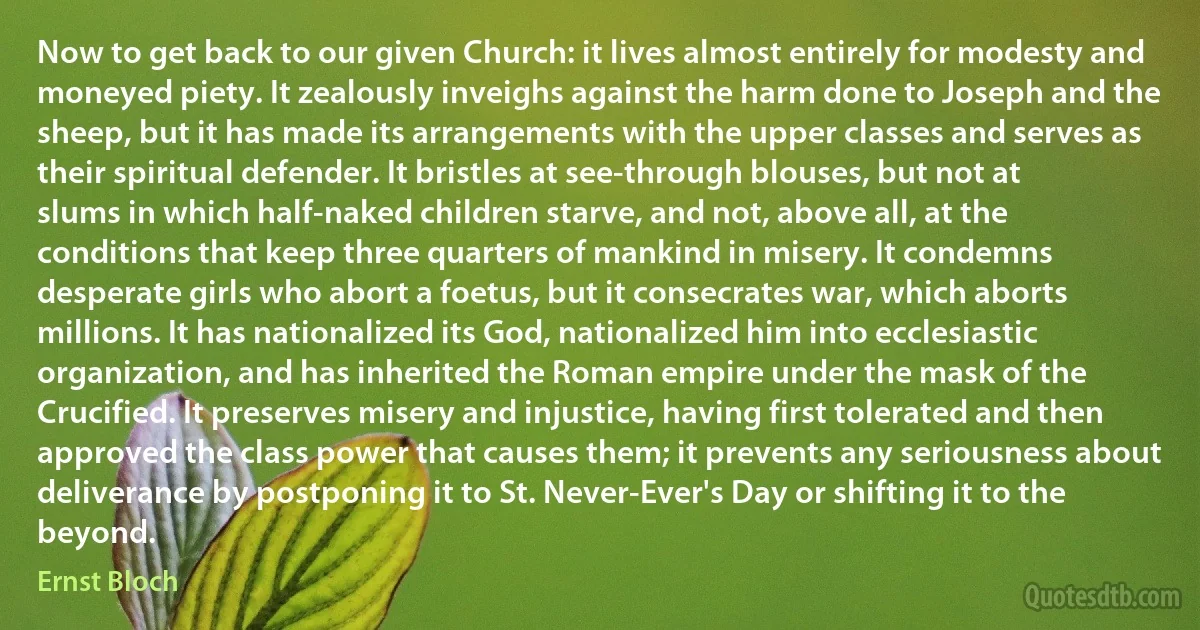
Now to get back to our given Church: it lives almost entirely for modesty and moneyed piety. It zealously inveighs against the harm done to Joseph and the sheep, but it has made its arrangements with the upper classes and serves as their spiritual defender. It bristles at see-through blouses, but not at slums in which half-naked children starve, and not, above all, at the conditions that keep three quarters of mankind in misery. It condemns desperate girls who abort a foetus, but it consecrates war, which aborts millions. It has nationalized its God, nationalized him into ecclesiastic organization, and has inherited the Roman empire under the mask of the Crucified. It preserves misery and injustice, having first tolerated and then approved the class power that causes them; it prevents any seriousness about deliverance by postponing it to St. Never-Ever's Day or shifting it to the beyond.
Ernst BlochRelated topics
abort above almost beyond children church day desperate done foetus given harm having lives mask misery modesty now organization power sheep three under war quarters girlsRelated quotes
After fighting, scheming and murdering in pursuit of the secure tenure of absolute power, he found himself at last on a lonely pinnacle over an abyss, with no use for his power and security unattainable. His genius was such that he ended an epoch and began another - but one of unceasing war and misery, from which exhaustion produced an approach to order after two generations and peace at last under the Roman Empire. He himself never found peace. One is tempted to see him, in medieval terms, as the man who sold his soul to the Devil for power: the Devil kept his part of the bargain but ultimately claimed his own. But to the historian, prosaically such allegory, we must put it differently: to him, when he has done all the work - work that must be done, and done carefully - of analysing the play of faction and the system of government, Alexander illustrates with startling clarity the ultimate loneliness of supreme power.

Ernst Badian
Indeed I am ill-starred, for even if he dies I have no hope of happiness; with Jason dead, I should taste real misery. Away with modesty, farewell to my good name! Saved from all harm by me, let him go where he pleases, and let me die. On the very day of his success I could hang myself from a rafter or take a deadly poison. Yet even so my death would never save me from their wicked tongues. My fate would be the talk of every city in the world; and here the Colchian women would bandy my name about and drag it in mud – the girl who fancied a foreigner enough to die for him, disgraced her parents and her home, went off her head for love. What infamy would not be mine? Ah, how I grieve now for the folly of my passion! Better to die here in my room this very night, passing from life unnoticed, unreproached, than to carry through this horrible, this despicable scheme.

Apollonius of Rhodes
In modern industry the managerial groups in many areas rise to a position more significant than that of the owners or the workers. Decision often rests largely in their hands, providing, of course, they are able to point to a generous measure of financial success in their particular enterprise. Wages to the workers, profits to the owners, prices and goods to the consumers--these are allocated in great measure by the managers of the concern and tolerated on the terms just stated.
The managerial group develops also in other social groups as well as in industry. Labor, agriculture, and professional associations tend to set up a strong structure in which the managerial skills and personalities are very prominent. In the ecclesiastical groupings this form of organization has long been evident, not only in the Catholic church but in other creeds and organizations as well.

Charles Edward Merriam
There are three basic theories about this coming Final Empire, or The New World Order.
1. It will be a revival of the Roman Empire, where ten European countries try to band together, maybe like the European Common Market.
2. It will be an attempted union of ten world regions, like a North American Region, Asia-Pacific Region, etc.
3. It will be an alliance of 10 Muslim countries that surround (and hate) Israel and have for 4,000-years!
My study has led me to believe this final 10 nation empire will be 10 Muslim nations since they all hate each other and fight all the time just as God said they would in Genesis 16:12. They will never really "bond,” just as iron and clay will not bond with each other. Since this kingdom will have areas where enforcement of their rules and policies (like maybe taking a mark to buy and sell (Revelation 13-14)?) will be "weak” or "broken,” I have long prayed for God to put me some place where it is broken!

Kent Hovind
I came to understand why animals have horns. It was the incomprehensibility that could not be contained within their lives, a wild and obsessive caprice, their ill-judged and blind obstinacy. Some idée fixe-grown beyond the borders of their being and high above their heads, suddenly brought into the light-had solidified into palpable, hard matter. There, it had assumed its wild, incalculable, and incredible shape, twisted into a fantastical arabesque, invisible to their eyes, but dreadful nonetheless, the unknown numeral under whose menace they lived. I understood why those animals were disposed to ill-judged and wild panic, to startled frenzy. Herded into their mania, they could not extricate themselves from the knot of those horns, and so, lowering their heads, they looked out sadly and wildly from between them as if trying to find a pathway through their branches.

Bruno Schulz
